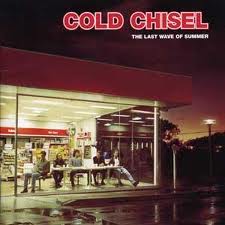
Cold Chisel are an Australian pub rock band, which formed in Adelaide in 1973 by mainstay members Ian Moss on guitar and vocals, Steve Prestwich on drums and Don Walker on piano and keyboards. They were soon joined by Jimmy Barnes on lead vocals and, in 1975, Phil Small became their bass guitarist. The group disbanded in late 1983 but subsequently reformed several times. Musicologist Ian McFarlane wrote that they became "one of Australia's best-loved groups" as well as "one of the best live bands", fusing "a combination of rockabilly, hard rock and rough-house soul'n'blues that was defiantly Australian in outlook."

Ian Richard Moss is an Australian rock musician from Alice Springs. He is the founding mainstay guitarist and occasional singer of Cold Chisel. In that group's initial eleven year phase from 1973 to 1984, Moss was recorded on all five studio albums, three of which reached number one on the national Kent Music Report Albums Chart. In August 1989 he released his debut solo album, Matchbook, which peaked at number one on the ARIA Albums Chart. It was preceded by his debut single, "Tucker's Daughter", which reached number two on the related ARIA Singles Chart in March. The track was co-written by Moss with Don Walker, also from Cold Chisel. Moss had another top ten hit with "Telephone Booth" in June 1989.

The Last Wave of Summer is the sixth studio album by Australian pub rock band, Cold Chisel. It was released in October 1998 and reached number-one on The Australian ARIA Charts. It was the band's first studio album in 14 years.

Breakfast at Sweethearts is the second studio album by Australian pub rock band Cold Chisel, released in February 1979. It spent 32 weeks in the national charts, reaching a peak of number 4.

Cold Chisel is the debut album of Australian pub rock band Cold Chisel. Released in April 1978, it spent 23 weeks in the Australian charts, peaking at number 38.

East is the third studio album by Australian pub rock band Cold Chisel, released in June 1980. The album peaked at No. 2 and spent 63 weeks on the national chart. It was the biggest-selling Australian album release of the year. It was the only Cold Chisel album to chart in America, reaching 171 on the Billboard 200. It also reached number 32 on the New Zealand charts.

Circus Animals is the fourth studio album by Australian band Cold Chisel, released on 8 March 1982. It was recorded and mixed at Paradise Studios and EMI Studios 301, Sydney, between September and December 1981. It reached number one on the Australian charts, remaining in the charts for 40 weeks, and also topped the New Zealand charts. The working title for the album was "Tunnel Cunts".

Swingshift is a live album released by Australian band Cold Chisel in 1981. It was their first album to reach No. 1 on the Australian chart, debuting there in its first week. It peaked at number 9 in New Zealand. A press release said the title referred to, "the midnight to dawn shift that the staff in asylums dread: the hours when the crazies go crazy."

"Tucker's Daughter" is the debut single by Australian rock singer and guitarist, Ian Moss. It was released in November 1988 almost five years after his group, Cold Chisel, had disbanded for the first time. It is co-written by Moss and Don Walker. The song was the lead single from Moss' debut studio album, Matchbook (1989).

"Saturday Night" is a 1984 single from Australian rock band Cold Chisel, the second released from the album Twentieth Century and the first to be issued after the band's official break-up. The vocals are shared between Ian Moss and Jimmy Barnes. It just missed out on becoming the band's third Top 10 single, stalling at number 11 on the Australian chart for two weeks, but it remains one of Cold Chisel's highest charting songs.

Teenage Love is a compilation album by Australian pub rock band Cold Chisel, released in 1994. The album collected studio recordings, many just demos, that were not used on previous albums. Phil Small said, "There was always a surplus of 3 to 4 tracks with each album." The tracks were recorded between 1976 and 1983. "Hands Out of My Pocket", "Nothing But You" and "Yesterdays" were issued as singles.

Donald Hugh Walker is an Australian musician and songwriter who wrote many of the hits for Australian pub rock band Cold Chisel. Walker is considered to be one of Australia's best songwriters. In 2012 he was inducted into the Australian Songwriter's Hall of Fame.

"Choirgirl" is a song by Australian rock band Cold Chisel, released as the lead single from their third studio album East (1980) in November 1979. A ballad written by Don Walker with an R&B influenced melody, the song marked the first time the band had recorded with producer Mark Opitz. It peaked at No. 14 in Australia on the Kent Music Report.

No Plans is the seventh studio album by Australian rock band Cold Chisel. It was released on 6 April 2012 and was the band's first studio album in 14 years. It features the final recorded performances by drummer Steve Prestwich, who died of a brain tumour in January 2011. The album peaked at number 2 on the Australian charts.

Unlimited Address was the debut album by Australian band Catfish. Released in 1988, it spent one week in the Australian charts, peaking at number 50.

The Perfect Crime is the eighth studio album by Australian rock band Cold Chisel. It was released on 2 October 2015. It was the first album not to feature a contribution from drummer Steve Prestwich, who died of a brain tumour in January 2011. The album peaked at number 2 on the Australian charts and number 7 in New Zealand.

Sad but True is the debut studio album by Australian rock band Tex, Don and Charlie. It was released in November 1993. It spent 6 weeks in the Australian charts, peaking at number 40. In 2010, it was listed in the book, 100 Best Australian Albums.

Blood Moon is the ninth studio album by Australian rock band Cold Chisel. It was released on 6 December 2019, and is supported by the lead single "Getting the Band Back Together". It is the band's first studio album since 2015's The Perfect Crime. The band toured in support of the album from 31 December 2019 until February 2020. The album debuted atop the ARIA Albums Chart, becoming the band's fifth album to reach the summit and first since The Last Wave of Summer in 1998.

Lightning in a Clear Blue Sky is the fourth album by Australian musician Don Walker, released in 2023. It debuted at number 2 on the Australian Independent charts.




















